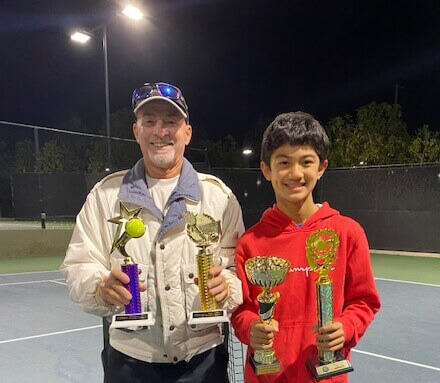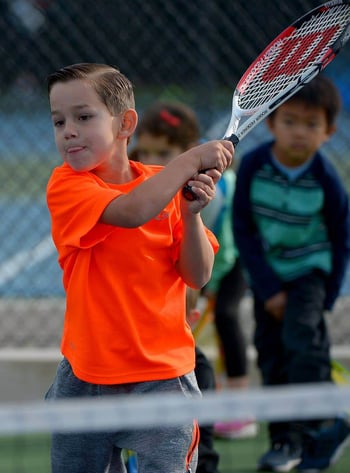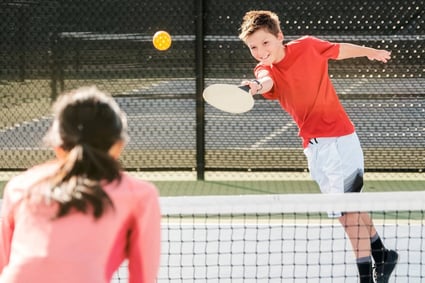Why kids who play sports get better grades in school
October 3rd, 2023 | 4 min. read

Raising kids in 2023 is no joke. It is hard work that takes creativity, stamina, and determination.
From a young age, kids are exposed to pop culture, social media, and potentially unhealthy peer relationships that can negatively affect their self-esteem, mental health, and academic performance.
You want the best for your child and for them to have as many opportunities to be successful in school and life. Sometimes it can feel impossible to guide them when outside influences pack such a punch.
The African proverb “It takes a village to raise a child” may sound idealistic and out of context for raising your kids in the US. But it doesn’t have to be that way. One of the most critical places a child can feel a part of their “village” is joining a sports team led by a caring, skillful coach.
The Paseo Club is a social club in the Santa Clarita Valley that has supported members in health and fitness for over twenty years. We provide a community-focused place for members to work out, socialize, and support each other.
We have learned that kids benefit from being involved in sports — physically, mentally, and academically. In this article, you will learn what challenges kids face, why their academic performance improves when they are involved in sports, and what essential skills kids learn when they play sports.
What are the challenges kids face, and how do they affect grades?
 Kids from preschool age through high school are facing unprecedented times. In a recent poll, 71% of kids ages 3-17 are facing challenges that concern their parents.
Kids from preschool age through high school are facing unprecedented times. In a recent poll, 71% of kids ages 3-17 are facing challenges that concern their parents.
Common issues were mental health, bullying, academic pressures, and still being affected socially by the COVID-19 pandemic.
All these stressors affect your child’s ability to do well in school.
- Increases stress
- Reduces motivation
- Increase the likelihood of dropping out of school
- Reduce ability to focus and follow through on assignments
Stress has an impact on children’s mental and physical health, increasing the chances of:
- Anxiety
- Poor sleep
- Depression
- Substance abuse
These elements combined make it hard for kids to succeed in school.
How do sports benefit kids?
 Sports and physical activity have been scientifically proven to help children and teens in a myriad of ways — physically, mentally, socially, and academically.
Sports and physical activity have been scientifically proven to help children and teens in a myriad of ways — physically, mentally, socially, and academically.
Youth who play sports:
- Get exercise
- Learn teamwork
- Elevate their self-esteem
- Improve cognitive function
- Learn good sportsmanship
- Lower stress, anxiety, and depression
- Reduce the chance of substance abuse and suicide
- Aids in the development of emotional ties with their peers
- Improve bone and cardiovascular health and minimize the chance of developing diabetes
Becoming a member of a team also provides your child with adult mentors, creating a sense of belonging and connection with their peers.
 Kids who play sports perform better academically
Kids who play sports perform better academically
Several studies have researched the role of sports in young people’s schooling. Overwhelmingly, students who participate in sports perform better academically compared with non-athletes.
- Higher rates of graduation
- Higher assessment scores
- Higher rates of school attendance
- 15% more likely to attend college
- Earn up to 40% higher test scores
- Lower rates of suspension and expulsion
- Former student-athletes tend to earn significantly higher incomes than those who did not play sports
- 70% of boys and girls who participated in tennis aspired to attend and graduate from a four-year college
Why do kids who play sports do better in school?
When youth are involved in sports, they develop skills that translate well into healthy school habits and attitudes.
Patience
Student-athletes learn the art of patience as they focus on team-building, skill-building, and athletic success. None of these things happen overnight, and it requires patience and its cousin, perseverance. These are essential skills for helping them focus and be dedicated to completing difficult tasks. .png?width=325&height=444&name=crop_compressed_IMG-0428%20-%20Edited%20(1).png) Planning
Planning
Student-athletes have to juggle a full schedule that rotates between practice, seasonal games, team meetings, and, of course, academic responsibilities. A demanding load makes players aware of the need for planning — and that every second counts. This understanding is especially useful in helping young people reach their goals in education and life.
Leadership
Leadership is an excellent skill for all areas of life — sports, schooling, and eventually, careers and civic engagement such as volunteerism. Leadership qualities are listening, having emotional intelligence, being attentive to others, and knowing how to support their best traits.
Students who exhibit leadership skills can be a positive influence on their classmates by being dedicated to their studies and caring for their instructors and peers.
Self-discipline
It is no surprise that maintaining good grades and excelling in sports requires discipline. Students must learn to prioritize tasks, plan in advance, and budget time. Students also learn accountability — to their teachers, parents, coaches, and ultimately, to themselves.
Perseverance
Perseverance is the continued effort to achieve something despite difficulties, failure, or opposition. When a kid loses a game, misses a shot, or gets a C- on an exam — these are all opportunities to pause, reflect, and persevere. Perseverance teaches youth that not everything in life comes easily and that many of our greatest successes come from effort and dedication.
Respect for authority
Although the concept of respecting authority can sound old-fashioned in this day and age, it still has a place in society. Children benefit from having loving parents who set healthy guidelines and boundaries for them. A coach or other adult mentor iterates those same values you provide at home, such as integrity, good communication, how to support and encourage others, self-discipline, and much more.
When children have these attributes modeled for them by adults they care for and trust, they are more likely to adopt them and apply them to all areas of their lives, including schooling. These traits help lead them to their continued success as adults.
Getting your child involved in sports
%20(1).jpg?width=403&height=302&name=comp_IMG_5809%20(1)%20(1).jpg) Modeling being active is an important first step to inspiring your kid’s passion for sports and athletics. Share your interests with them, but be receptive to what they are excited to play as well.
Modeling being active is an important first step to inspiring your kid’s passion for sports and athletics. Share your interests with them, but be receptive to what they are excited to play as well.
Make sure to have realistic expectations about your child’s achievements. The goals are they have fun, make friends, develop healthy habits, and feel good about themselves. Not everyone will become an Olympian or pro athlete — and that is ok.
If your child wants to pursue competitive sports on an elite level, make sure they are balancing their responsibilities well and are making time to relax and socialize.
Tennis is shown to be an excellent sport for youth. Kids who play tennis tend to participate in it for many years, perform well academically, are less prone to risky behaviors, and are psychologically healthy.
The Paseo Club offers a junior tennis program for children ages three through seventeen. Kids can begin to learn tennis no matter what level they play — beginner, intermediate, or advanced. Our tennis instructors are both accomplished players and experienced coaches, so you can rest assured that your child will receive the best care.
Junior tennis is open to all of Santa Clarita Valley — members and nonmembers. But if you would like to consider joining the Paseo Club, now is a great time to do so!
Join the Paseo Club and enjoy all eight acres of our facility — the tennis and pickleball courts, fitness areas, junior Olympic pool, spa, cafe, and more.

